

The Cornell Note-taking System. Why do you take notes?
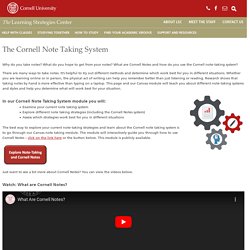
What do you hope to get from your notes? What are Cornell Notes and how do you use the Cornell note-taking system? There are many ways to take notes. It’s helpful to try out different methods and determine which work best for you in different situations. Five secrets to revising that can boost your grades. How do you get the most out of your revision time, and end up with the best grades you can?

Or, if you're a different sort of student, how can you get the same grades you're getting now, but spend less time revising? Either way, you need to know how to learn better. And fortunately, decades of research carried out by psychologists about learning and memory has produced some clear advice on doing just that. As an experimental psychologist, I am especially interested in learning.
As 10 melhores formas de estudo, segundo a ciência. Um estudo recentemente publicado em janeiro de 2013 na revista científica Psychological Science in the Public Interest avaliou dez técnicas comuns de aprendizagem para classificar quais possuem de fato a melhor utilidade.

O resultado do paper (íntegra aqui) traz algumas surpresas para o estudante. Técnicas bastante populares no Brasil, como resumir, grifar, utilizar mnemônicos, visualizar imagens para apreensão de textos e reler conteúdos foram classificadas como as de utilidade mais baixa. Três práticas foram encaradas como de utilidade moderada: interrogação elaborativa, auto-explicação e estudo intercalado. TEORIA DE AUSUBEL. David Ausubel. Origem: Wikipédia, a enciclopédia livre.
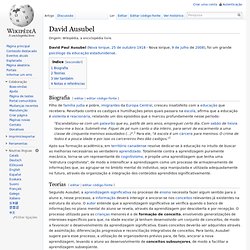
David Paul Ausubel (Nova Iorque, 25 de outubro 1918 - Nova Iorque, 9 de julho de 2008), foi um grande psicólogo da educação estadunidense. Mapas mentais: Imagens que ensinam. Jamerson Costa Especial para o SOS Concurseiro Os mapas mentais são uma ferramenta útil na hora de aprender matérias novas, extensas ou complexas.
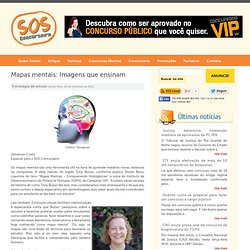
9 evidence-based study tips.
Guias e estratégias para estudar. Study skills. Study skills or study strategies are approaches applied to learning.
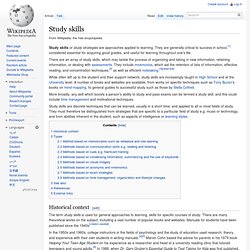
They are generally critical to success in school,[1] considered essential for acquiring good grades, and useful for learning throughout one's life. There are an array of study skills, which may tackle the process of organizing and taking in new information, retaining information, or dealing with assessments. They include mnemonics, which aid the retention of lists of information, effective reading, and concentration techniques,[2] as well as efficient notetaking.[3][dead link] While often left up to the student and their support network, study skills are increasingly taught in High School and at the University level. A number of books and websites are available, from works on specific techniques such as Tony Buzan's books on mind-mapping, to general guides to successful study such as those by Stella Cottrell.
Historical context[edit] Types[edit]
Simple Ways To Study Better. Knowledge is the essence of smart thinking. No matter how much raw intelligence you have, you are not going to succeed at solving complex problems without knowing a lot. That's why we spend the first 20 (or more) years of our lives in school. Robert Bjork and fellow PT blogger Nate Kornell have explored some of the study habits of college students in a 2007 paper in Psychonomic Bulletin & Review . Research on memory provides a number of important suggestions about the most effective ways to study. One of the most important tips is that students should study by testing themselves rather than just reading over the material. Of course, guidelines from memory research come from studies in idealized circumstances.
To address this question, Marissa Hartwig and John Dunlosky related the study habits of college students to their grade point average (GPA) in a 2012 paper in Psychonomic Bulletin & Review . All college students tend to focus their study on upcoming assignments. We're Only Human...: The Science of Cramming. I went to a very nerdy college.
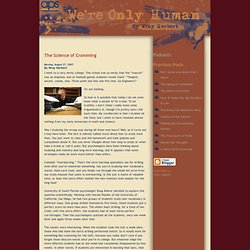
This school was so nerdy that the “mascot” was an engineer, and at football games students would chant: “Tangent, secant, cosine, sine. Three point one four one five nine. Go Engineers!” I'm not kidding. Study Smarter, Not Harder. Good students don't just study harder, they study smarter.
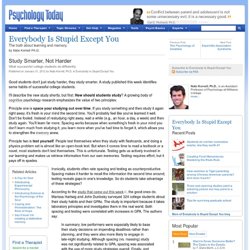
A study published this week identifies some habits of successful college students. I'll describe the new study shortly, but first: How should students study ? A growing body of cognitive psychology research emphasizes the value of two principles: Principle one is space your studying out over time . Think You Know How To Study? Think Again. Study Guides and Strategies. Reading Strategies - Learning Skills from MindTools. Reading Efficiently by Reading Intelligently Get the most from your reading. © iStockphoto/mammamaart Whether they're project documents, trade journals, blogs, business books or ebooks, most of us read regularly as part of our jobs, and to develop our skills and knowledge.
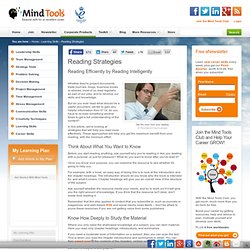
Método de Estudo. Muitos dos problemas de aprendizagem existentes entre os estudantes são hoje explicados pela ausência ou uso inadequado de métodos de estudo e pela inexistência de hábitos de trabalho que favoreçam a aprendizagem.
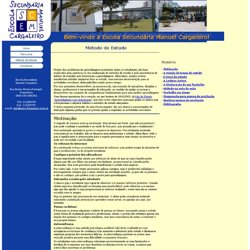
Além disso, muitos jovens manifestam atitudes negativas face ao estudo, uma enorme desmotivação para as actividades escolares, dedicando-lhes muito pouco tempo. Bjork Learning and Forgetting Lab - Research. Applying Cognitive Psychology to Enhance Educational Practice The primary goal of this research, which is funded by the James S. McDonnell foundation, is to promote learning and memory performance within educational contexts through the investigation of principles in cognitive psychology. Studies address issues of transfer-appropriate and material-appropriate processing between encoding and retrieval. Applying tests in order to enhance learning and determining the desirable amount and timing of feedback regarding an individual's memory performance are methods that are currently under investigation. The overlying theme of "desirable difficulties," first introduced by Robert Bjork (1994), is also explored through manipulations in the spacing of learning events and the study schedule produced by interleaving various to-be-learned items, such as English-Swahili translated word pairs or prose materials.
I. In recent years, we have explored this phenomenon in a variety of ways. II. R. III. V. Everything You Thought You Knew About Learning Is Wrong. Learning through osmosis didn't make the strategies list image courtesy of Flickr user indi.ca Taking notes during class? Topic-focused study? A consistent learning environment? All are exactly opposite the best strategies for learning. Really, I recently had the good fortune to interview Robert Bjork, director of the UCLA Learning and Forgetting Lab, distinguished professor of psychology, and massively renowned expert on packing things in your brain in a way that keeps them from leaking out.
Here's what he said. Test-Taking Cements Knowledge Better Than Studying, Researchers Say. Mind - Research Upends Traditional Thinking on Study Habits.